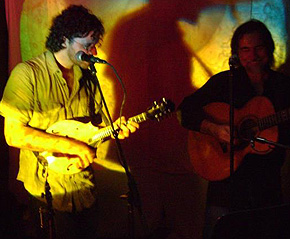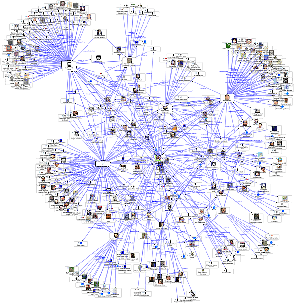May 8, 2012
Grateful Dead Cover Duo, Lost in Space Jam, Returns to Earth Displaced in Time

The very same musical excursion that lasted a brief instant for Steve Roy (mandolin) and David Surette (guitar) actually elapsed over the course of nearly five minutes for those observing from terrestrial vantage points.
PORTSMOUTH, NH — During a set of Grateful Dead covers last night, Steve Roy and David Surette experienced the phenomenon of relativistic time dilation, with both jammers becoming lost at high-velocity in the un-navigable reaches of outer space before eventually returning to Earth, a planet where far more time had passed.
“It was a classic space jam,” said Lina Tullgren, a stationary observer positioned at a table in the audience at the Dolphin Striker restaurant.
A space jam, (not to be confused with the 1996 movie of the same name starring Michael Jordan and Bugs Bunny) is a free collaborative musical endeavor that appears to non-participating listeners to be composed of haphazardly paced constellations of random notes, often separated by vast amounts of space or silence.
Roy’s and Surette’s duo, now called Grateful Times, uses just a guitar and mandolin to recreate the magical, jam-oriented arrangements of the entire classic Grateful Dead band. Both men sing.
“The song was ‘Big Boss Man’, I think. Key of D. The crowd was pretty chill, definitely onboard with the whole Dead thing,” said a second observer, also named Tullgren.
After the third verse, a subsequent instrumental exploration left the Earth’s orbit almost immediately. The jam soon expelled both musicians deep into space where they traveled together at maximum speeds, no longer subject to the gravitational influence of the solar system or even the immediate galactic surroundings, including the three nearest stars of Alpha and Proxima Centauri.
“Parallax navigation becomes extremely difficult, if not impossible when the jam is that far out in space. The distances are simply too great,” said John Mailander, a student at the Berklee College of Music.
“It’s hard to find your way back to where you started,” he added.
Indeed, many concertgoers believed the duo would be lost in space forevermore, or at least until the end of the concert at 10pm.
According to Einstein’s Theory of Relativity, time itself operates differently for entities moving at different velocities. Time appears to pass more slowly for fast moving bodies when they are observed from a fixed point of reference.
Such effects increase dramatically as the motion differential approaches the speed of light.
“Very simply, temporal dilation is the disparity in elapsed time between two events seen by observers either moving relative to each other or differently situated from gravitational masses,” said Dr. B. Vituos, an MIT professor of introductory physics who specializes in explaining difficult concepts in plain English.
Because Roy and Surette were not moving relative to one another, they experienced their own musical excursion at an ordinary, uniform tempo. However, the rapid, unpredictable motion of the entire jam itself through the cosmos made time appear to pass very slowly and erratically for Surette and Roy (to those watching from Earth.)
“Yes, definitely,” said L. Tullgren.
Amazingly, the same jam that lasted just a brief instant for Surette and Roy actually elapsed over the course of nearly five minutes to those observing from Earth.
“We really fell into the quarry on that one,” said Roy.
“Basically, we ended up flying through a total vacuum at close to the speed of light, with no clear way back to Earth. It’s a miracle we made it home,” said Surette.
“Grateful times,” added Roy.







Comments
Got something to say?
You must be logged in to post a comment.